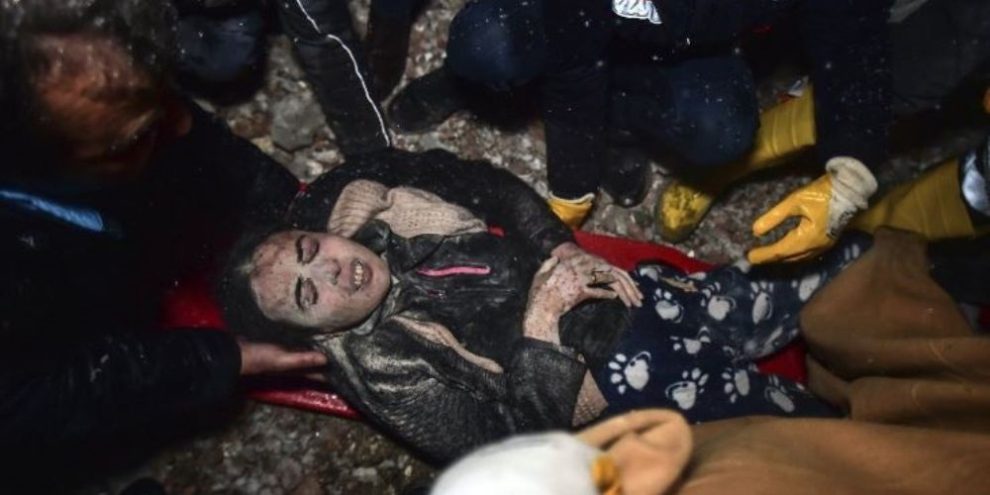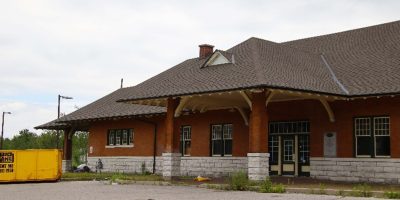
By Mehmet Guzel, Ghaith Alsayed And Suzan Fraser in Nurdagi for The Associated Press
Search teams and international aid poured into Turkey and Syria on Tuesday as rescuers working in freezing temperatures and sometimes using their bare hands dug through the remains of buildings flattened by a powerful earthquake. The death toll soared above 7,200 and was still expected to rise.
But with the damage spread over a wide area, the massive relief operation often struggled to reach devastated towns, and voices that had been crying out from the rubble fell silent.
“We could hear their voices, they were calling for help," said Ali Silo, whose two relatives could not be saved in the Turkish town of Nurdagi.
In the end, it was left to Silo, a Syrian who arrived a decade ago, and other residents to recover the bodies and those of two other victims.
Monday's magnitude 7.8 quake and a cascade of strong aftershocks cut a swath of destruction that stretched hundreds of kilometers (miles) across southeastern Turkey and neighboring Syria. The shaking toppled thousands of buildings and heaped more misery on a region shaped by Syria’s 12-year civil war and refugee crisis. One temblor that followed the first registered at magnitude 7.5, powerful in its own right.
Unstable piles of metal and concrete made the search efforts perilous, while freezing temperatures made them ever more urgent, as worries grew about how long trapped survivors could last in the cold.
The scale of the suffering — and the accompanying rescue effort — were staggering.
More than 8,000 people have been pulled from the debris in Turkey alone, and some 380,000 have taken refuge in government shelters or hotels, said Turkish Vice President Fuat Oktay. They huddled in shopping malls, stadiums, mosques and community centers, while others spent the night outside in blankets gathering around fires.
Many took to social media to plead for assistance for loved ones believed to be trapped under the rubble. Turkey's state-run Anadolu Agency quoted Interior Ministry officials as saying all calls were being “collected meticulously” and the information relayed to search teams.
Turkish President Recep Tayyip Erdogan said 13 million of the country's 85 million people were affected, and he declared a state of emergency in 10 provinces.
For the entire quake-hit area, that number could be as high as 23 million people, according to Adelheid Marschang, a senior emergencies officer with the World Health Organization.
“This is a crisis on top of multiple crises in the affected region,” Marschang said in Geneva.
Turkey is home to millions of refugees from the Syrian civil war. The affected area in Syria is divided between government-controlled territory and the country’s last opposition-held enclave, where millions live in extreme poverty and rely on humanitarian aid to survive.
The Palestinian Authority said that 57 Palestinian refugees were among the dead — 14 in Turkey and 43 in Syria, a country that for decades has hosted nearly a half-million Palestinians in large refugee camps.
Teams from nearly 30 countries around the world headed for Turkey or Syria.
As promises of help flooded in, Turkey sought to accelerate the effort by allowing only vehicles carrying aid to enter the worst-hit provinces of Kahramanmaras, Adiyaman and Hatay.
The United Nations said it was “exploring all avenues” to get supplies to rebel-held northwestern Syria. Sebastien Gay, the head of mission in the country for Doctors Without Borders, said health facilities were overwhelmed, and medical personnel were working around around the clock to help the wounded.
Nurgul Atay told The Associated Press she could hear her mother's voice beneath the rubble of a collapsed building in the Turkish city of Antakya, the capital of Hatay province. But efforts to get into the ruins had been futile without any heavy equipment to help.
“If only we could lift the concrete slab, we'd be able to reach her,” she said. “My mother is 70 years old, she won't be able to withstand this for long.”
But help did reach some. Several dramatic rescues were reported across the region as survivors, including small children, were pulled from the rubble more than 30 hours after the earthquake.
Residents in a Syrian town discovered a crying infant whose mother apparently gave birth to her while buried in the rubble of a five-story apartment building, relatives and a doctor said.
The newborn was found buried under the debris with her umbilical cord still connected to her mother, Afraa Abu Hadiya, who was found dead, they said.
The baby was the only member of her family to survive from the building collapse in the small town of Jinderis, next to the Turkish border, Ramadan Sleiman, a relative, told The Associated Press.
In the city of Aleppo, a Maronite Christian convent opened its doors to hundreds of residents who fled their shaking homes.
“Based on our principles and ideas of receiving the most needy, we wanted to make sure that everybody who was scared or lost their house or was on the streets could find shelter here,” said Brother George Sabah. “We opened every part of the convent. There isn’t a space in the convent that isn’t being used by people, including the elderly, children, men, women.”
Turkey has large numbers of troops in the border region and has tasked the military with aiding in the rescue efforts, including setting up tents for the homeless and a field hospital in Hatay province.
A navy ship docked on Tuesday at the province’s port of Iskenderun, where a hospital collapsed, to transport survivors in need of medical care to a nearby city. Thick, black smoke rose from another area of the port, where firefighters have not yet been able to douse a fire that broke out among shipping containers toppled by the earthquake.
Turkey’s emergency management agency said the total number of deaths in the country had passed 4,500, with some 26,000 people injured.
The death toll in government-held areas of Syria climbed over 800, with some 1,400 injured, according to the Health Ministry. At least 900 people have died in the rebel-held northwest, according to the White Helmets, the emergency organization leading rescue operations, with more than 2,300 injured.
The region sits on top of major fault lines and is frequently shaken by earthquakes. Some 18,000 were killed in similarly powerful earthquakes that hit northwest Turkey in 1999.
___
Alsayed reported from Azmarin, Syria, while Fraser reported from Ankara, Turkey. Associated Press writers David Rising in Bangkok, Zeynep Bilginsoy and Robert Badendieck in Istanbul, Bassem Mroue and Kareem Chehayeb in Beirut, Kim Tong-hyung in Seoul, South Korea, and Riazat Butt in Islamabad, contributed to this report.





